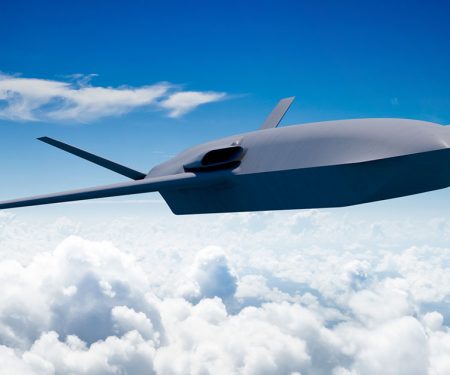Radar Sweep
FEATURE: How Drone Combat in Ukraine Is Changing Warfare
The war in Ukraine has been characterized by drone deployment of unprecedented scale, with thousands of unmanned aerial vehicles (UAVs) used to track enemy forces, guide artillery, and bomb targets. Reuters analyzed more than 50 videos of drone attacks, collated research, and spoke to over a dozen manufacturers, soldiers, and officials about how the technology is transforming warfare.
Amid US-Israeli Strains, Pentagon Pushes for a New Approach in Gaza
Defense Secretary Lloyd Austin urged Israel on March 26 to abandon plans for a major ground offensive against Hamas militants in southern Gaza, as the Biden administration attempts to curtail a spiraling humanitarian crisis at a moment of acute strain between the United States and its closest Middle Eastern ally.
Cancer Rate among Air Force Missileers Prompts Questions, Concerns
It is a little-known mission within the United States Air Force that operates almost entirely underground, shrouded in secrecy – and is critical to national security. Those tasked with the job are known as missileers. Their work requires them to be on alert 24/7, and they are responsible for the maintenance, security and operation of the United States’ arsenal of Minuteman III nuclear intercontinental ballistic missiles. ... Now, a mysterious threat has potentially emerged, which has prompted investigations by the Air Force and Department of Defense.
Raytheon Awarded Sole-Source Radar Upgrade for Taiwan
Raytheon Technologies has been awarded a sole-source contract to update Taiwan’s decade-old surveillance radar system, according to a U.S. government announcement. The upgrade will “increase the air surveillance capability for the system. This effort will further enhance the air surveillance mission software capabilities,” an Air Force spokesperson told Breaking Defense.
Another Airman Probed by FBI for Allegedly Leaking Intel on Discord
The FBI in 2022 investigated an Air Force intelligence analyst for allegedly leaking classified information in an anti-government group on the messaging platform Discord, according to an affidavit that was recently unsealed in federal court. Former Staff Sgt. Jason Gray, who served as a cyber analyst with the 381st Intelligence Squadron at Joint Base Elmendorf-Richardson, Alaska, was accused of sharing a classified image that he “likely obtained” via his access to National Security Agency intelligence in a private channel under the username LazyAirmen#7460, according to the November 2022 affidavit obtained by Air Force Times.
Sweden’s Saab to Open New US-Based Munitions Factory
Swedish manufacturer Saab announced March 26 it will build a “new advanced manufacturing facility and center of innovation for weapon systems” in the U.S. “The innovative new site will support the engineering and production of missile weapon systems for the U.S. military, such as components for the Ground-Launched Small Diameter Bomb (GLSDB) system, and close combat weapons,” the Stockholm-based firm said. “Final site selection and groundbreaking is planned for 2024, with production underway by 2026.”
Trilateral AUKUS Alliance Kicks off Prize Competition Focused on Electromagnetic Spectrum Capabilities
The Defense Innovation Unit launched a first-of-its-kind prize challenge focused on providing electromagnetic spectrum technologies to give U.S. forces and key international partners an edge over adversaries. The competition is intended to support the Australia, United Kingdom, and United States (AUKUS) military alliance, which was established in September of 2021 to bolster trilateral information sharing and technology development and better integrate the nations’ industrial bases.
Finland to Host NATO Tech Centers, Revamp Cybersecurity Strategy
One of NATO’s newest members plans to build and jointly operate two research centers and an accelerator facility for the alliance as part of a program dubbed DIANA. The move comes as Finland also seeks to ramp up its defense strategy and capacity to deal with escalating cyberthreats.
After Deadly Crash, Some Ospreys Are Flying Again in Japan
The Air Force is still not flying Osprey aircraft in Japan despite getting the green light to lift a monthslong flight hold following a deadly crash off the country's southern coast, but the Marine Corps has put its aircraft based there back in the skies. Rebecca Heyse, an Air Force Special Operations Command spokeswoman, told Military.com on March 26 that none of the service's units have resumed flying the Osprey yet.
Defense Secretary Meets with Israeli Counterpart as Tensions Grow
Defense Secretary Lloyd Austin met with Israeli Defense Minister Yoav Gallant at the Pentagon on March 26 as tensions soared this week between the U.S. and Israel over the war in Gaza, where more than 32,000 Palestinians have been killed. During the meeting, Austin discussed efforts to minimize casualties in Gaza and get more humanitarian aid into the coastal enclave, according to a senior U.S. defense official, who described it as “very productive.”
Greece Plans to Sell F-16s, Mirages to Rationalize Its Fighter Inventory
Greece looks poised to offload both its early-model F-16s and its French-made Mirage 2000 fighters, as part of a major overhaul of its armed forces, including the Hellenic Air Force. The F-16s and Mirages could be attractive on the secondhand market and it’s notable that the two types have also been repeatedly associated with potential transfers to Ukraine—which could be set to receive its first F-16s before the end of this year.
Air Force Special Operators Must Take Class Before Getting Shaving Waivers
Airmen with the 1st Special Operations Wing are required to take a class on how to shave before they can request a waiver for medical conditions exacerbated by shaving, said wing commander Col. Patrick Dierig. “The intent of the course is to improve the process for those members who need a legitimate shaving waiver,” Dierig said in a statement to Task & Purpose. “I intend to remove any unwarranted stigma with the waivers by improving the process.”
DOD Corrects Replicator Inaccuracy, Providing Rare Glimpse into Budget Decision Process
Amid news of Congress allotting $200 million to the secretive Replicator program in a new spending deal, senior defense officials told Inside Defense in an exclusive interview that an inaccuracy was made in Replicator's published—and later corrected—fiscal year 2025 budget request, leading to an inside look at the Pentagon's internal decision-making process. Multiple senior defense officials who discussed the matter requested anonymity to talk about internal Pentagon deliberations, highlighting the sensitivity (and anxiety) that public discussion of the mostly classified Replicator program has caused in recent months.
Controversial Military Reproductive Health Care Travel Policy Was Used Just 12 Times in 7 Months
A controversial military policy that allows service members to be reimbursed for travel if they or a family member have to go out of state for reproductive health care—including abortions—was used just 12 times from June to December last year, the Pentagon said March 26.
Why the ‘Peanut Butter’ Shot Is the Most Dreaded Injection
In the first few weeks of boot camp, every recruit will get in a line during their medical evaluations and get stuck in the arm with all sorts of needles and have thermometers shoved into some uncomfortable places. Welcome to the military! Out of all the medications recruits get injected with throughout their processing week, none of them are as feared as the almighty "peanut butter" shot. This tasty-sounding treat isn't reserved for one branch of the military—everyone gets one.





